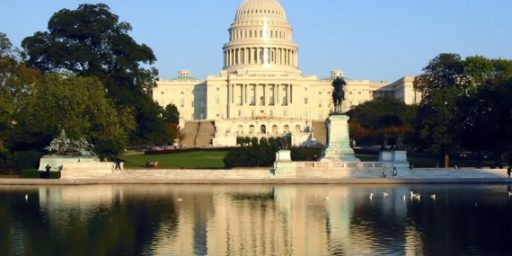Unhappy With Bush
Following on to James’ post noting that some conservatives are unhappy with Bush, I thought I’d pile on (even though I’m not really a conservative although I’m called one all the time). My problem with Bush is his spending. He spends, spends, spends, and then spends more…and then even more. Right now Bush’s spending will likely go well over a trillion dollars in the next ten years (the bulk of it being the Medicare Prescription Drug Blackhole). If you are a fiscal conservative and you think deficits are important, or you don’t like higher taxes, then you absolutely have to be disappointed in Bush. There is really no way around this.
While the short term budgetary outlook has improved recently, the overall prospects are still pretty grim. Many conservatives (link link link link) have been crowing about the improved budgetary outlook and ignoring the fine print in that there are reasons not to expect this improvement to continue (CBO). The Center on Budget and Policy Priorities has an interesting tabel on this deficit reduction.
|
TABLE 1 |
||||||||||||||||||
|
||||||||||||||||||
Note that yes the deficit is lower and yes revenues are higher. But so is spending. Spending went up by $51 billion since CBO last round of projections back in March. Bush just can’t keep from spending money.
And while the CBO and others are projecting economic growth through 2006 they are not projection a surge in economic activity. In other words, we should not expect any more dramatic improvements in the budgetary picture in the near future. Further, while the tax cuts may have been quite fortuitous in there timing, there benefit is likely being offset by the rise in oil/gasoline prices. So this bit of good news, while indeed good news, it doesn’t mean what many are saying in regards to the Laffer curve, tax cuts, and the economy. On top of this the Medicare Prescription Drug program will go into effect in January 2006. So, this notion that the Bush tax cuts are working might be true, but Bush is doing everything he can to spend whatever extra revenue that comes in. Fiscal conservatives, libertarians, and deficit hawks should view Bush in a very bad light.





As Brad DeLong used to say, where are the grown-up Republicans? The ones for whom principles mattered?
It’s just comical, in a grim way, to hear people criticizing the Dems for “not standing for anything.” Other than the executive’s inalienable right to suspend prohibitions against torture, I haven’t seen that this White House stands for anything … am I missing something?
Sadly revenues are not that much higher. The growth in the economy has been anemic with the possibility of another recession next year.
It disturbs me that this is presented as some sort of major success and proof of the tax cuts. If these people were arguing that the Bush policies had prevented a very serious decline and that this so so situation was the alternative, then there would be a honesty to their approach. But Kudlow and others literally talk of the “Bush economic miracle.”
Zero savings? Growth based on spending borrowed money? Possible speculative imbalances (including a stock market still overvalued by historical standards) and very risky behaviors (read some hedge funds) possibly fueled by releasing too much money at the top?
What we need in this country is a big-C Conservative Party. Then we could elect fiscal conservatives who would do something about all this damn spending!
In the meantime, I guess we’ll have to live with the 290 or so Republicans we sent to Washington. We learned long ago, during Ronald Reagan’s administration, that no dramatic progress against big government was politically possible. When Reagan took office, the Deparment of Education was only 2 years old. That was the time to strangle the bastard.
I don’t worry about the $331 billion deficit. I’m far more disturbed by the $2.5 trillion budget. But I also realize we lost that war, decades ago.
Also, this zero savings rate business is just a little bogus. When economists talk about savings, they’re talking about a passbook account. When non-economists talk about savings, they’re talking about their 401k.
Mr. Maher:
During the Clinton era growth was reduced and the budget deficit temporarily halted. So when you say we “learned” that this kind of thing is impossible because it didn’t happen under Reagan, you are looking through ideologically skewed lenses.
It is possible to reduce budget as a percentage of gnp. Or has been. Actually general fund percentages have fallen over time. Medicare and social security have risen. But it went from nearly 25% under Reagan to 20% under Clinton.
It has increased again not only due to a strange Medicare drug bill no body can support, but pork rich packages such as the recent transportation bill that would not make it under recent president and also the delayed taxes with interest marketed as cuts.
One of the problems is that the political chatterers are not able to distinguish between varoous blends of concervative and also capitalist. Bush, Cheney and Rumsfeld are all “crony capitalists.” Bush got his money because he was a front man for a group that had a city raise funds to build them a baseball park, he felt no qualms when the court rule that the condemned land had been bought at one third value. Cheney and Rumsfeld sold government contacts and became rich.
The same attitude that this is the highest form of capitalism informed the building of Iraq. Naturally it is going to be reflected in government spending and budgets. A liberal who had been engaged in competitive enterprise would very likely bring another state of mind.